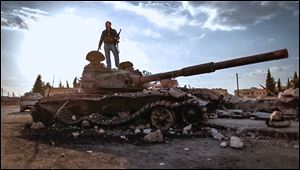
Assad denies playing role in attack on Syrians
U.S. is warned of retaliation if airstrike occurs
9/9/2013
This citizen journalism image provided by the Syrian Revolution against Bashar Assad shows a Free Syrian army fighter standing on a damaged military tank in Zabadani, near Damascus on Sunday.
WASHINGTON — Syrian President Bashar Assad denied he was behind a chemical weapons attack near Damascus last month and warned that if the United States strikes militarily, those aligned with Syria will retaliate.
“There has been no evidence that I used chemical weapons against my own people,” Assad was quoted on Sunday in a CBS report.
Assad said he feared an attack would degrade the Syrian military and tip the balance in the 2½-year-old civil war, CBS said.
Assad also said “it had not been a good experience” for Americans “to get involved in the Middle East in wars and conflicts.” “They should communicate to their Congress and to their leadership in Washington not to authorize a strike,” he added.
The full interview airs on the CBS network and PBS’ Charlie Rose show today.
Denis McDonough, White House chief of staff, made the rounds of five Sunday talk shows to call on Congress to support a resolution authorizing a limited strike on Syria.
President Obama faces an uphill climb to persuade U.S. lawmakers returning from a summer recess to vote for military action.
During the break, constituents voiced strong objections, worrying military action would drag the nation into another costly and broader Mideast conflict.
U.S. Secretary of State John Kerry did not rule out France’s idea to go to the U.N. Security Council for authorization of a possible military strike once U.N. inspectors finish a report on the Aug. 21 attack that killed more than 1,400 people.
After meeting in Paris with Arab foreign ministers, Mr. Kerry said Saudi Arabia backed “the strike” to punish Syria for the chemical attack.
Qatar Foreign Minister Khalid bin Mohammad Attiyah, speaking at a news conference with Mr. Kerry, called for foreign intervention “to protect the Syrian people.”
Saudi Arabia and Qatar have been among the leading weapons suppliers to the Syrian rebels and long have backed unspecified direct foreign intervention in Syria. Although neither has said whether it would participate in a U.S.-led military strike, Mr. Attiyah said Sunday his government was considering ways it could be of assistance.
Qatar also joined a statement, signed by 11 U.S. allies at last week’s Group of 20 summit in Russia, condemning chemical-weapons use, holding Assad responsible for the “horrific” chemical attack, and calling for a “strong international response.” The initial signatories were Australia, Canada, France, Italy, Japan, South Korea, Saudi Arabia, Spain, Turkey, Britain, and Germany.
Meanwhile, a German newspaper reported that Syrian government forces may have carried out the chemical weapons attack without Assad’s approval.
Germany’s Bild am Sonntag paper, citing German intelligence, said that Syrian brigade and division commanders had been asking the presidential palace to allow them to use chemical weapons for the last four-and-a-half months, according to radio messages intercepted by German spies.
Permission always had been denied, the paper said.
This could mean Assad may not have personally approved the attack under question, intelligence officers suggested.
Bild said the radio traffic was intercepted by a German naval reconnaissance vessel, the Oker, sailing close to the Syrian coast.
On the U.S. television talk shows on Sunday, Mr. McDonough led the administration’s lobbying effort, part of an intensive push for support that will continue today when Mr. Obama sits for six network television interviews and culminates with an address to the country Tuesday night.
“Are there consequences for a dictator who would have used those weapons to gas to death hundreds of children? The answer to that question ... will be followed closely in Damascus, but will also be followed closely in Tehran, among Lebanese Hezbollah, and others. So this is a very important week,” Mr. McDonough said on Fox News Sunday.
While Mike Rogers (R., Mich.) chairman of the House Intelligence Committee, supports the strikes, he said the President had made “a hash” of his argument to punish Assad. “It’s very clear he’s lost support in the last week,” Mr. Rogers said on Face the Nation.
He said Mr. Obama should have called Congress back from its summer break for classified briefings on the proposed strikes and the administration needed to “regroup.” “The President hasn’t made the case,” Mr. Rogers said.
Congressional surveys make it clear Mr. Obama has a difficult task: A Washington Post vote count showed 223 House members either against or leaning against authorization. That is more than the 217 needed to block the resolution.
The White House has said the President could go ahead with a military strike without congressional authorization, but has not said he would do so.
Mr. Obama will meet with Senate Democrats on Tuesday to seek support for U.S. military action, a Senate Democratic aide said Sunday.
Amid skepticism from both parties, the Senate is expected to hold its first showdown vote on a use-of-force resolution Wednesday.
In Syria, rebels led by al-Qaeda-linked fighters seized control of a predominantly Christian village northeast of Damascus, sweeping into the mountains in heavy fighting overnight and forcing hundreds of residents to flee, activists and locals said.
The battle over Maaloula, an ancient village that is home to two of the oldest surviving monasteries in Syria, has thrown a spotlight on the deep-seated fears that many of Syria’s religious minorities harbor about the growing role of Islamic extremists on the rebel side in the civil war against the Assad regime.
After days of clashes in and around Maaloula, rebels captured the village following fierce fighting late Saturday, according to the Britain-based Syrian Observatory for Human Rights, a monitoring group.